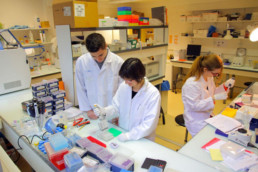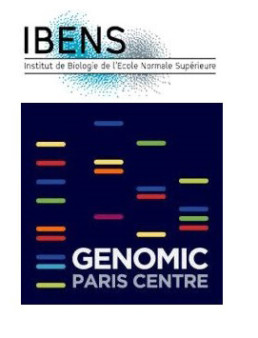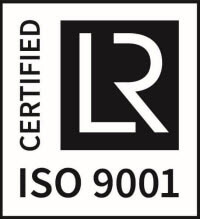Sequencing plateform Genomic Paris Centre – IBENS
Introduction
The platform ‘Genomic Paris Centre’ was created in1998, with the following aims:
1) To make functional genomics technologies available to public sector research laboratories,
2) To assist researchers to manage their high-throughput genomics projects,
3) To widely disseminate the approaches across the scientific community.
With 7 staff members (5.2 ETP), we have the capacity to support around 70 projects per year from the definition of the experimental design to the analysis and publication of the results.
The financial support of the Genomic ENS core facility must be separated between running cost and equipment. Considering yearly running cost, our budget is balanced. Our facility is self-financed for the running costs thanks to our collaborative project activity. It allows us to pay for a short-term contract and gives us priming money for device investment. However, the facility equipment is mainly supported through national call for proposal.
Expertise
The facility supports its collaborators by providing access to high-throughput sequencing, with particular expertise in functional genomics applications in eukaryotes :
- Transcriptomics: RNA-seq (low input, long-read, single-cell)
- Epigenomics/Epitranscriptomics: ChIP-seq, RNA m6A methylation
We also propose a sequencing service “ready-to-load” for users who make their own libraries.
Equipments
- Sequencing (short reads): NextSeq 2000 and NextSeq 500 (Illumina)
- Sequencing (long reads): MinION and MinION Mk1C (Oxford Nanopore Technologies)
- Single-cell transcriptomics: Chromium Controller (10x genomics)

Main achievements
Our platform hosts medium-sized projects (around ten samples per project) on a varied number of model or non-model eukaryotic species (more than twenty currently ranging from fungi to mammals) with topics mainly related to development, neuroscience and genetic regulation. The projects we take on are very often limited in terms of the quantity of starting material and we have now developed a real expertise in the management of this type of studies.
We also have a bioinformatics tool development activity focused on the analysis and automated quality control of the projects we process. We have developed innovative solutions (Eoulsan and Aozan) using calculation distribution tools (cloud computing, MapReduce, Hadoop), traceability and source code availability (GitHub and Docker).
Bioinformatics analysis
For collaborative projects sequenced in our facility we perform quality controls, RNA-seq differential analyses (including complex designs) on Illumina and Nanopore datasets, isoform identification (Nanopore), m6A methylation detection for direct RNA sequencing (Nanopore) and scRNA-seq using Cell Ranger
- Development of bioinformatics tools:
- Aozan – an automated post-sequencing data-processing pipeline
- Article: doi:10.1093/bioinformatics/btx154
- GitHub: https://github.com/GenomicParisCentre/aozan
- ToulligQC – QC analyses of Oxford Nanopore runs
- Eoulsan – an efficient workflow manager for reproducible bulk, long-read and single-cell transcriptomics analyses
- Original Article: doi:10.1093/bioinformatics/bts165
- Update preprint: doi.org/10.1101/2021.10.13.464219
- GitHub: https://github.com/GenomicParisCentre/eoulsan
- Aozan – an automated post-sequencing data-processing pipeline
Research and Development
- Single-cell RNA-seq coupled with long-read sequencing;
- Single-cell RNA-seq on fixed cells (ACME protocol).
Main achievements
Our facility hosts medium-sized projects on more than 20 model or non-model eukaryotic species, with topics mainly related to development, neuroscience and genetic regulation. The projects we collaborate on are often limited in terms of amount of starting material (low input), thanks to which we have developed a real expertise in the management of this type of experimental designs.
Our facility has a recognized expertise in Nanopore long-read transcriptomics, and we have organised six training sessions in 2021 to teach how to use a MinION sequencer (wet-lab and bioinformatics).
We also have a bioinformatics tool development activity focused on the analysis, traceability and automated quality control of data. We have developed innovative solutions (Eoulsan, Aozan and ToulliqQC), maintained over time, and freely available to the community (code available on GitHub with Docker images).
- Lehmann N, Perrin S, Wallon C, Bauquet X, Deshaies V, Firmo C, Du R, Berthelier C, Hernandez C, Michaud C, Thieffry D, Le Crom S, Thomas-Chollier M, Jourdren L. Eoulsan 2: an efficient workflow manager for reproducible bulk, long-read and single-cell transcriptomics analyse Bioarxiv 2021 doi.org/10.1101/2021.10.13.464219
- Mazaré N, Oudart M, Moulard J, Cheung G, Tortuyaux R, Mailly P, Mazaud D, Bemelmans AP, Boulay AC, Blugeon C, Jourdren L, Le Crom S, Rouach N, Cohen‑Salmon M. Local Translation in Perisynaptic Astrocytic Processes Is Specific and Changes after Fear Conditioning. Cell Rep 2020 Aug 25;32(8):108076. org/10.1016/j.celrep.2020.108076
- Fiorucci AS, Bourbousse C, Concia L, Rougée M, Deton-Cabanillas AF, Zabulon G, Layat E, Latrasse D, Kim SK, Chaumont N, Lombard B, Stroebel D, Lemoine S, Mohammad A, Blugeon C, Loew D, Bailly C, Bowler C, Benhamed M, Barneche F Arabidopsis S2Lb links AtCOMPASS-like and SDG2 activity in H3K4me3 independently from histone H2B monoubiquitination. Genome Biol 2019 May 21;20(1):100. doi: 10.1186/s13059-019-1705-4.
- Dardalhon-Cuménal D, Deraze J, Dupont CA, Ribeiro V, Coléno-Costes A, Pouch J, Le Crom S, Thomassin H, Debat V, Randsholt NB, Peronnet F. Cyclin G and the Polycomb Repressive Complexes PRC1 and PR-DUB cooperate for developmental stability. PLOS Genetics 2018 14:7 org/10.1371/journal.pgen.1007498
- Benchouaia M, Ripoche H, Sissoko M, Thiébaut A, Merhej J, Delaveau T, Fasseu L, Benaissa S, Lorieux G, Jourdren L, Le Crom S, Lelandais G, Corel E, Devaux F Comparative Transcriptomics Highlights New Features of the Iron Starvation Response in the Human Pathogen Candida glabrata. Front Microbiol 2018 Nov 16;9:2689. doi:10.3389/fmicb.2018.02689.
Last update Nov 2021

Certification / Quality Assurance
We are fully committed to the ISO 9001 quality management system and obtained our first certification in March 2013, completed by the validation of the NF X50-900 standard in April 2016. Certifications have been renewed in 2019.
Labels
The platform was labelled successively RIO-RNG from 2002 to 2007 and then was IBiSA certified since 2008 .

Platform Managment
Morgane THOMAS-CHOLLIER
Stéphane LE CROM
Plateforme Genomic ENS
Institut de Biologie de l’École Normale Supérieure (IBENS)
46 rue d’Ulm 75230 Paris Cedex 05, France
Contacts
Stéphane LE CROM
genomique@bio.ens.psl.eu
01 44 32 39 76

